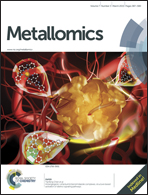Overcoming the concentration-dependence of responsive probes for magnetic resonance imaging
Abstract
In magnetic resonance imaging, contrast agents are molecules that increase the contrast-to-noise ratio of non-invasively acquired images. The information gained from magnetic resonance imaging can be increased using responsive contrast agents that undergo chemical changes, and consequently changes to contrast enhancement, for example in response to specific biomarkers that are indicative of diseases. A major limitation with modern responsive contrast agents is concentration-dependence that requires the concentration of contrast agent to be known: an extremely challenging task in vivo. Here, we review advances in several strategies aimed at overcoming the concentration-dependent nature of responsive contrast agents.


 Please wait while we load your content...
Please wait while we load your content...